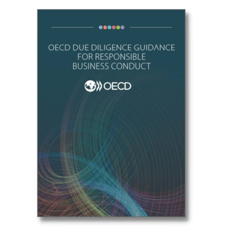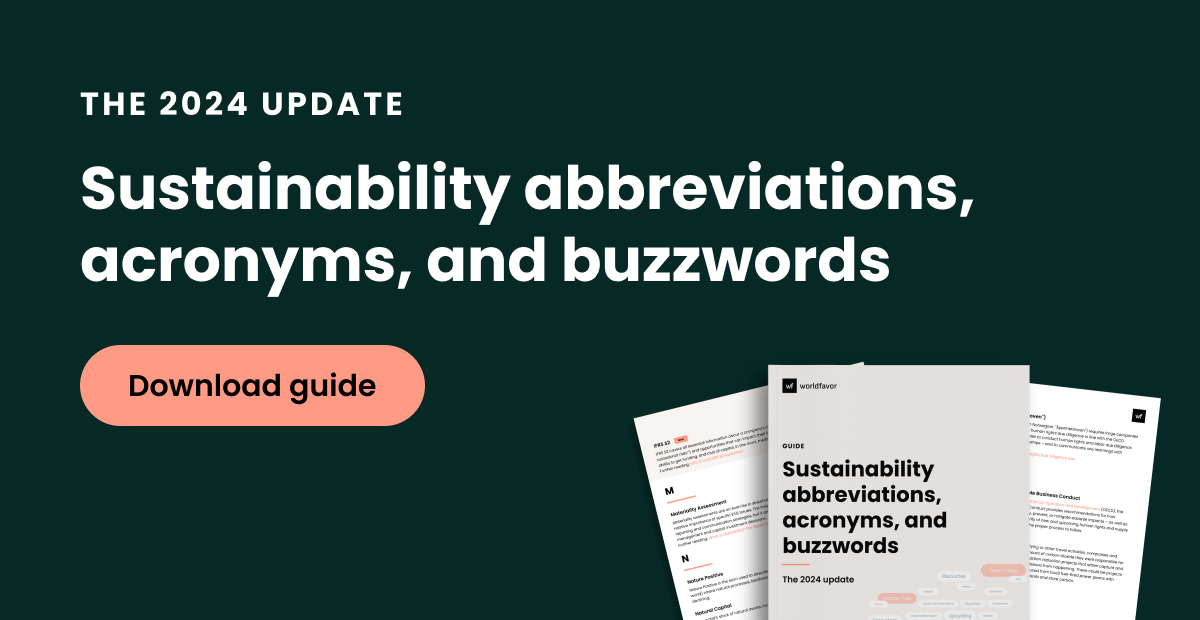The sustainability buzzwords we see trending in 2023
It’s finally here! We just released the 2023 edition of the Worldfavor Guide to Sustainability Abbreviations, Acronyms, and Buzzwords – the only glossary of trending words, terms, and acronyms you need if you're working in (or just thinking about!) the sustainability business world.
Claim your 2023 updated copy of the guide here:
.png)
Published: January 2023
These days, if companies want to stay relevant (or even just survive), they can no longer afford to ignore their impact on the environment and society. While it's key for people to become more fluent in the language of sustainability, this evolution has caused confusion over all of the new terms, acronyms, and abbreviations companies are expected to track and explain.
That’s why our Guide to Sustainability Abbreviations, Acronyms, and Buzzwords was born! Year after year, we’ve kept it updated with the very latest sustainability terms, acronyms, and abbreviations you're sure to come across as you explore the sustainability world. Now, it’s finally time for the 2023’s update.
Spoiler alert: Keep reading to get a sneak peek of some of the glossary's newcomers – but be sure to download the full copy here:
We've added...
Carbon Tunnel Vision
Also known as “carbon tunnel syndrome,” this term refers to the narrow focus on net zero emissions, while ignoring other sustainability goals. A selective focus on carbon emissions can lead to inadequate sustainability management, partial solutions, and harm to other sustainability objectives – while this concept promotes a more holistic approach.
Impact washing
Stemming from the more mainstream concept of greenwashing, this term is used to describe assets, bonds, and investments whose positive impact on the environment and society are falsely claimed, overstated, or can’t be supported with accurate data.
While impact washing can be intentional, it also happens unintentionally through inadequate methodologies and lack of insights into funds.
Nature Positive
Nature Positive is the term used to describe a world (including the societies and governments within that world) where natural processes, biodiversity, and ecosystems are restored and regenerating – rather than declining.
OECD Due Diligence Guidance for Responsible Business Conduct

Developed and published by the Organisation for Economic Co-
operation and Development (OECD), the OECD Due Diligence Guidance for Responsible Business Conduct provides recommendations for how enterprises can conduct due diligence in order to identify, prevent, or mitigate adverse impacts – as well as account for how those impacts are addressed. The majority of new and upcoming human rights and supply chain due diligence laws refer to the OECD Guidance as the proper process to follow.
Corporate Sustainability Reporting Directive (CSRD)
The Corporate Sustainability Reporting Directive (CSRD) is the EU’s new directive requiring all listed companies on EU-regulated markets (except micro-enterprises) to report on the social and environmental impacts of their operations. The Directive was approved in December 2022, and the first round of companies included in its scope are obligated to publish their first report in 2025 (covering the 2024 fiscal year).
Read more about the CSRD here.
European Sustainability Reporting Standards (ESRS)
The European Sustainability Reporting Standards (ESRS) are the EU’s new mandatory standards that companies under the Corporate Sustainability Reporting Directive (CSRD) must align their reporting to. The standards provide long-awaited clarity on which metrics companies should include in their report – ensuring comparable, relevant, and reliable sustainability data from all organizations in its scope.
Read more about the ESRS here.
... and many more! If you want to impress your colleagues, business partners, and customers with your sustainability expertise – make sure to get your own copy of the guide to keep all the essential lingo close at hand at all times!





%20as%20the%20deadline%20approaches.%20Learn%20about%20compliance%20requirements%2c%20potential%20delays%2c%20and%20key%20updates..png)

